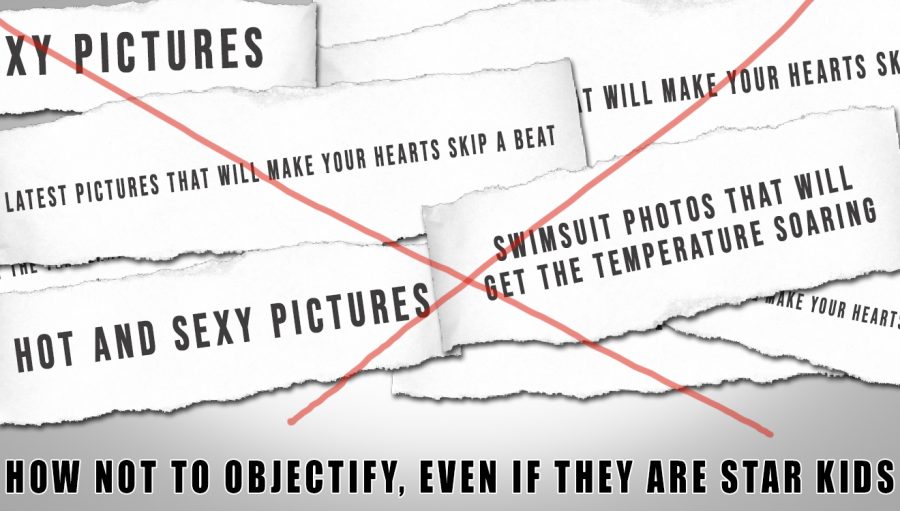Nearly two years after Shah Rukh Khan and Shweta Bachchan Nanda had condemned the objectification of their children by various media, almost nothing seems to have changed. Pop-ups continue to announce pictures of celebrity kids that are ‘breaking the internet’ – often with distasteful descriptions.
The Celebrity Internet (CI) is all kinds of strange. It treats its subjects as if they were members of a rare, endangered breed whose moves need to be documented for posterity. For nowhere else would you ‘spot’ a baby Taimur with his mother, or in more sinister instances, ‘hot, sexy pictures’ of star kids who are dangerously underage. The CI seems to have no moral compunctions about giving into its voyeuristic instincts, or into those of its disturbingly large consumer base.
In July 2016, a photo of the then 15-year-old Suhana Khan, daughter of actor Shah Rukh Khan and wife Gauri Khan, went viral. It was a picture shot on the beach; the teenager was seen in a neon bikini, posing next to her baby brother, Abram. The ‘news’ articles and the headlines that preceded them – describing the photograph and the child in vivid detail – prompted Shah Rukh Khan to reach out to the web portals and have them removed.
Later, in an interview with Huffington Post, the actor said: “She was in a bikini, she was on a beach, and she was with her little brother. You went ahead and wrote a headline, ‘SRK’s daughter flaunts her body.’ Is it a little cheap? Maybe I felt it was. I reached out nicely and said, ‘dude, your website is not going to run on my daughter’s bikini body, can you please take it out?’ People saw where I was coming from. My daughter was a little awkward about it. She’s 16, yaar. And the headlines some sites use are… wow. We’re very liberal people and even had a laugh about it. But it’s still awkward.”
A few months later, Shweta Bachchan Nanda, socialite and television anchor, and also the daughter of Amitabh Bachchan and Jaya Bhaduri, had written a column for a newspaper, calling the ‘articles’ about her daughter Navya “invasive and inappropriate,” and how helpless she felt as a parent.
Shah Rukh Khan though, attributed the attention that Suhana was getting to his stardom. “I wasn’t protecting her from the media,” he’d said, “I was protecting her from me.”
The actor may have reacted in a reflexive outpouring of parental guilt, but the matter isn’t as simple as that. While just about anything passes for news in a world driven by abject sensationalism and a need to grab eyeballs, the trend of preying on children to further traffic is perhaps the most repulsive of all.
Aside the fact that the subjects are mostly minors whose pictures are used without consent (often downloaded from social media accounts), there seems to be absolutely no news value to the articles. Consider the time when Ananya Pandey’s pictures were splashed all over the internet even before Karan Johar announced her debut in Student Of The Year 2. Or more recently when photographs of Sridevi’s daughters – Janhvi and Khushi Kapoor – found their way into sections dubiously titled entertainment news well before Janhvi’s first film could go on floors. While it perhaps began as a PR exercise gone wrong, like in the case of Sara Ali Khan, possibly the first celebrity kid who was wildly photographed wherever she went, ahead of her debut – there can be no uncertainty about the intent of such articles now.
In Hollywood, it was Emma Watson, the star of the Harry Potter series, who had to battle the press that documented most of her childhood and all of her adulthood. While the popular narrative in such cases is fond – a child star whose physical and professional growth the audiences are privy to – the actress herself had described the experience as ‘terrifying’. “As a young person, that feeling of not being comfortable in my own skin was exacerbated by the microscope I was under. People [were] asking me ‘What do you think of this? Who are you, who are you, who are you? I felt so inadequate because I just didn’t have answers yet. I questioned everything. I was terrified by the level of interest in me,” she was reported to have said during several instances.
The media began treating her on par with an adult star when she was a teen, splashing pictures of her with questionable focus on her body, while the coverage of her co-star in the Harry Potter series, Dan Radcliffe, was comparatively tame.
In fact, Radcliffe, during an interview with Associated Press, had said that while he got labelled as an “unconventional” rom-com hero because people can’t stop associating him with Harry Potter, his response to that was: “Well, the male population had no problem sexualising Emma Watson immediately.”
Recommended
A recent study commissioned by The Royal Australian and New Zealand College of Psychiatrists aired concerns about the sexualisation of children in contemporary media. Professor Louise Newman, of The Royal Australian and New Zealand College of Psychiatrists presented ‘Too Hot To Handle: The Psychological Impact of Sexualisation in Media’ at the Conference on ‘Children and the Media’ in Sydney. The theme of the conference was ‘Growing up fast and furious: Reviewing the impacts of violent and sexualised media on children’.
“Sexualisation of children involves the imposition of adult models of sexual behaviour and sexuality on to children and adolescents at developmentally inappropriate stages and in opposition to the healthy development of sexuality. It encompasses sexual objectification and representation of children in adult sexual ways and in ways that imply the child’s value is dependent on conforming to a particular appearance, sexual display or behaviours,” wrote Professor Louise Newman.
Meanwhile, in Bollywood, the latest star kids to fall victim to prying camera lenses are Saif Ali Khan’s son Ibrahim Ali Khan and SRK’s son Aaryan Khan. There are pictures from their dinner dates, beach outings, and just about anyplace and any moment intimate. Recently, photographs of Janhvi Kapoor floated about on the Internet; the headlines made much of the fact that she was wearing a ‘see through’ dress. It took the intervention of Janhvi’s half-brother, Arjun Kapoor, to take down the pictures from the website they were on.
U know what Fuck u man fuck u as a website for highlighting or bringing it to anyone s attention…and it’s shameful that ur eye would go searching for something like this shame on u…this is how our country looks at young women yet another shining example…ashamed by this… https://t.co/ZjXFs8Qa9s
— arjunk26 (@arjunk26) April 12, 2018
Shweta Bachchan Nanda, in her open letter published by DNA, had written: “If she [daughter Navya] finds herself on a beach, she will wear beach-appropriate attire — namely, a swimsuit — as would any young girl anywhere. If there is music, she will dance much like her peers would. She will pout, she will preen, she will hang out with boys — the last time I checked, absolutely normal teenage behaviour!”
The Australian study on sexualisation of children in media concluded that “there is growing evidence that premature exposure to adult sexual images and values has a negative impact on the psychological development of children, particularly on self-esteem, body image and understanding of sexuality and relationships.”
Emma Watson may have braved all the unsolicited publicity that had come her way since childhood, even becoming a feminist icon as an adult, but not everyone who had grown up under the lights of a camera can be as fortunate. There may not be obvious signs of harm, but it’s only a matter of time before a young person succumbs to the pressure of living up to adult standards.
*****



